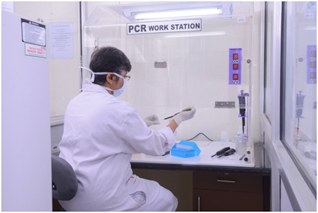Molecular Biology Laboratory at Kovai Medical Center and Hospital offers a range of assays to diagnose and treat patients with potentially infective microorganisms. Advanced analytical devices in medical genetics is utilized for this purpose. Specific genes and markers are detected in the biological samples such as blood and body fluids to identify the presence/absence of microorganisms or quantify their load.
The Molecular Diagnostic Assays offered by the laboratory carry the advantage of quick turn-around time, increased sensitivity and remarkable accuracy. The assays are done in two main phases.
- Extraction of the nucleic acid,(DNA and RNA): The laboratory has State-of-the-Art Automated Nucleic Acid Extractor, The Qiacube. The nucleic acid extractor is fitted with a robotic handler to minimize human error. The nucleic acids are extracted from the blood or body fluids in one hours time and the samples are prepared for further analysis.
- The samples are then amplified and the target gene is detected by a technique, Real Time PCR performed in a thermal cycler. This technique is very useful for generating precise quantitative data especially in viral load monitoring.
Currently the parameters undertaken in the lab include,
- Hepatitis B Virus Qualitative PCR
- Hepatitis C Virus Qualitative PCR
- Mycoreal PCR
- Hepatitis B Virus Quantitiative PCR
- Hepatitis C Virus Quantitative PCR
However initiatives to expand the ranges of tests offered have already been undertaken.
Sample Collection:
- All the blood samples are collected in EDTA vacutainers.
- The volumes of blood samples are:
Neonatal and infants:1.0ml
Children and adults: 4.0-6.0ml
- Body fluids and non-blood samples like human sputum, bronchoalveolar lavage(BAL), bronchial secretion, cerebro spinal fluid, stomach fluid or peritoneal fluid are also acceptable.
Sample Labelling:
To ensure that right tests are performed on the correct patient samples and to avoid incorrectreporting of results the following procedure for submission of samples is recommended.
Completed request forms for DNA tests should accompany each sample.
The following information is required on all the request forms
- Patients name
- Age and sex
- Register number/ IP No./ Request Number
- Date and time of collection
- Test requested
- Type or source of the specimen
- Consultant Name
The information on the sample tube and the request form must be identical.

Sample Storage:
Samples should be submitted to the laboratory as soon as possible but under special circumstances if the samples need to be stored, they may be placed at 4°C overnight.
Transport of the biological samples:
Samples must be enclosed in leak – proof primary containers. Both the primary and the secondary containers are to be clearly labeled. Any discrepancy between the labels will render the samples unsuitable for diagnostic tests. Liquid samples should be surrounded by absorbent material in a secondary container. The secondary container must be of the following specifications:
- Shatter and leak resistant
- Easily cleaned surface
- Enough space to hold the coolant or absorbent material
- Appropriate labels regarding the nature of the sample and the hazard
The following samples will not be acceptable for the tests:
- Samples that have not been clearly labeled or the REG Number is not visible.
- Clotted blood samples
- Samples that have been found leaking.
- Samples that do not have a request form or are accompanied by the wrong order/request form.
- Inadequate or wrong samples
- Request form and the sample do not match.
